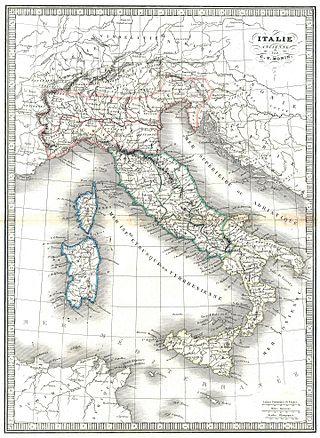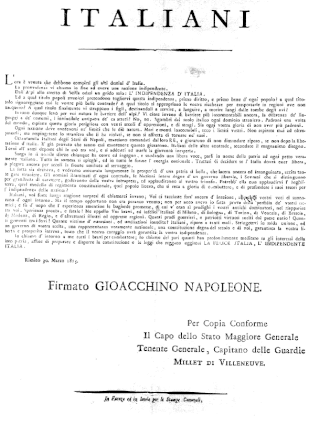Related Research Articles

The Napoleonic Wars (1803–1815) were a series of conflicts fought between the First French Empire under Napoleon Bonaparte (1804–1815) and a fluctuating array of European coalitions. The wars originated in political forces arising from the French Revolution (1789–1799) and from the French Revolutionary Wars (1792–1802), and produced a period of French domination over Continental Europe. The wars are categorised as seven conflicts, five named after the coalitions that fought Napoleon, plus two named for their respective theatres: the War of the Third Coalition, War of the Fourth Coalition, War of the Fifth Coalition, War of the Sixth Coalition, War of the Seventh Coalition, the Peninsular War, and the French invasion of Russia.

Eugène Rose de Beauharnais was a French nobleman, statesman, and military commander who served during the French Revolutionary Wars and the Napoleonic Wars. Through the second marriage of his mother, Joséphine de Beauharnais, he was the stepson of Napoleon Bonaparte. Under the French Empire he also became Napoleon's adopted son. He was Viceroy of the Kingdom of Italy under his stepfather, from 1805 to 1814, and commanded the Army of Italy during the Napoleonic Wars. Historians consider him one of Napoleon's most able relatives.

Ferdinand I was King of the Two Sicilies from 1816 until his death. Before that he had been, since 1759, King of Naples as Ferdinand IV and King of Sicily as Ferdinand III. He was deposed twice from the throne of Naples: once by the revolutionary Parthenopean Republic for six months in 1799, and again by a French invasion in 1806, before being restored in 1815 at the end of the Napoleonic Wars.

The War of the Third Coalition was a European conflict lasting from 1805 to 1806 and was the first conflict of the Napoleonic Wars. During the war, France and its client states under Napoleon I and its ally Spain opposed an alliance, the Third Coalition, which was made up of the United Kingdom, the Austrian Empire, the Russian Empire, Naples, Sicily, and Sweden. Prussia remained neutral during the war.

The Hundred Days, also known as the War of the Seventh Coalition, marked the period between Napoleon's return from eleven months of exile on the island of Elba to Paris on 20 March 1815 and the second restoration of King Louis XVIII on 8 July 1815. This period saw the War of the Seventh Coalition, and includes the Waterloo Campaign and the Neapolitan War as well as several other minor campaigns. The phrase les Cent Jours was first used by the prefect of Paris, Gaspard, comte de Chabrol, in his speech welcoming the king back to Paris on 8 July.

The Napoleonic era is a period in the history of France and Europe. It is generally classified as including the fourth and final stage of the French Revolution, the first being the National Assembly, the second being the Legislative Assembly, and the third being the Directory. The Napoleonic era begins roughly with Napoleon Bonaparte's coup d'état, overthrowing the Directory, establishing the French Consulate, and ends during the Hundred Days and his defeat at the Battle of Waterloo. The Congress of Vienna soon set out to restore Europe to pre-French Revolution days. Napoleon brought political stability to a land torn by revolution and war. He made peace with the Roman Catholic Church and reversed the most radical religious policies of the Convention. In 1804 Napoleon promulgated the Civil Code, a revised body of civil law, which also helped stabilize French society. The Civil Code affirmed the political and legal equality of all adult men and established a merit-based society in which individuals advanced in education and employment because of talent rather than birth or social standing. The Civil Code confirmed many of the moderate revolutionary policies of the National Assembly but retracted measures passed by the more radical Convention. The code restored patriarchal authority in the family, for example, by making women and children subservient to male heads of households.

Joachim Murat was a French military commander and statesman who served during the French Revolutionary Wars and Napoleonic Wars. Under the French Empire he received the military titles of Marshal of the Empire and Admiral of France. He was the first Prince Murat, Grand Duke of Berg from 1806 to 1808, and King of Naples as Joachim-Napoleon from 1808 to 1815.

In the War of the Sixth Coalition, sometimes known in Germany as the Wars of Liberation, a coalition of Austria, Prussia, Russia, Spain, Great Britain, Portugal, Sweden, Sardinia, and a number of German States defeated France and drove Napoleon into exile on Elba. After the disastrous French invasion of Russia of 1812 in which they had been forced to support France, Prussia and Austria joined Russia, the United Kingdom, Sweden, and Portugal, and the rebels in Spain who were already at war with France.

The Neapolitan War, also known as the Austro-Neapolitan War, was a conflict between the Napoleonic Kingdom of Naples and the Austrian Empire. It started on 15 March 1815, when King Joachim Murat declared war on Austria, and ended on 20 May 1815, with the signing of the Treaty of Casalanza. The war occurred during the Hundred Days between Napoleon's return from exile and before he left Paris to be decisively defeated at the Battle of Waterloo. The war was triggered by a pro-Napoleon uprising in Naples and ended with a decisive Austrian victory at the Battle of Tolentino, after which Bourbon monarch Ferdinand IV was reinstated as King of Naples and Sicily. However, the intervention by Austria caused resentment in Italy, which further spurred on the drive towards Italian unification.

The history of early modern Italy roughly corresponds to the period from the Renaissance to the Congress of Vienna in 1814. The following period was characterized by political and social unrest which then led to the unification of Italy, which culminated in 1861 with the proclamation of the Kingdom of Italy.

The Battle of Tolentino was fought from 2–3 May 1815 near Tolentino, Kingdom of Naples in what is now Marche, Italy: it was the decisive battle in the Neapolitan War, fought by the Napoleonic King of Naples Joachim Murat to keep the throne after the Congress of Vienna. The battle occurred during the Hundred Days following Napoleon's return from exile and, like the Battle of Waterloo, resulted in a decisive victory for the Seventh Coalition, leading to the restoration of the previous Bourbon king, Ferdinand I.

The Treaty of Florence, which followed the Armistice of Foligno, brought to an end the war between the French Republic and the Kingdom of Naples, one of the Wars of the French Revolution. Forced by the French military presence, Naples ceded some territories in the Tyrrhenian Sea and accepted French garrisons to their ports on the Adriatic Sea. All Neapolitan harbours were closed to British and Ottoman vessels.
The Battle of Occhiobello was fought on 8 April – 9 April 1815 and was the turning point of the Neapolitan War. Joachim Murat, King of Naples was repulsed by an Austrian force under the command of Johann Frimont whilst trying to cross the bridge over the Po River at Occhiobello. Following the battle, the Austrians would not lose an engagement for the remainder of the war.

Adam Albert, Count von Neipperg was an Austrian general and statesman. He was the son of a diplomat famous for inventing a letter-copying machine, and the grandson of Count Wilhelm Reinhard von Neipperg. His second wife, Empress Marie-Louise, was the widow of Napoleon and a daughter of Francis II, the last Holy Roman Emperor and founding Emperor of the Austrian Empire.
The Treaty of Casalanza, which ended the Neapolitan War, was signed on 20 May 1815 between the Napoleonic Kingdom of Naples on the one hand and the Austrian Empire, as well as the Great Britain, on the other. The signature occurred in a patrician villa, owned by the Lanza family, in what is now the commune of Pastorano, Campania, southern Italy.

The First French Empire, officially the French Republic, then the French Empire after 1809 and also known as Napoleonic France, was the empire ruled by Napoleon Bonaparte, who established French hegemony over much of continental Europe at the beginning of the 19th century. It lasted from 18 May 1804 to 3 May 1814 and again briefly from 20 March 1815 to 7 July 1815, when Napoleon was exiled to St. Helena.

The Rimini Proclamation was a proclamation by Joachim Murat, King of Naples, calling for the establishment of a united, self-governing Italy ruled by constitutional law. Its text is widely attributed to Pellegrino Rossi, later Papal Minister of Interior under Pope Pius IX. While it is primarily considered as a desperate attempt from Murat to retain the Neapolitan throne, the Rimini Proclamation was among the earliest calls for Italian unification.

The Kingdom of Naples was a French client state in southern Italy created in 1806 when the Bourbon Ferdinand IV & III of Naples and Sicily sided with the Third Coalition against Napoleon and was in return ousted from his kingdom by a French invasion. Joseph Bonaparte, elder brother of Napoleon I, was installed in his stead: Joseph conferred the title "Prince of Naples" to be hereditary on his children and grandchildren. When Joseph became King of Spain in 1808, Napoleon appointed his brother-in-law Joachim Murat to take his place. Murat was later deposed by the Congress of Vienna in 1815 after striking at Austria in the Neapolitan War, in which he was decisively defeated at the Battle of Tolentino.

The Army of the Kingdom of Naples was the primary land defence and offence force of the Kingdom of Naples. It served alongside Napoleon’s Grande Armée in various campaigns and wars across Europe, until its final demise in the Neapolitan War of 1815. It was in service from 1806 to 1815, reborn from the Army of the Two Sicilies after the annexation of Naples. The Army was more known for the splendour of its uniforms rather than the achievements of its troops.

The Italian Campaign of 1813-1814 was the series of military operations fought during the War of the Sixth Coalition, mainly in Northern Italy between the French Empire and the Coalition led by Austrians and British. It represented the last time of the so-called "French period", precisely from the campaign of 1796-1797, in which a French and an Austrian army confronted each other for control of the Italian peninsula. The Austro-Neapolitan War of 1815 was essentially a clash between only Italians and Austrians.
References
- ↑ M. Gibler, Douglas (2008). International Military Alliances. Douglas M. Gibler.
- ↑ Grau, Didier. "Napoléon & Empire Napoleonic Timeline: 1814". Napoléon & Empire Napoleonic Timeline: 1814.
- ↑ Atteridge, A. Hilliard (1911). Joachim Murat, marshal of France and king of Naples. London: Methuen. Chapter XVII. Retrieved 30 April 2021.